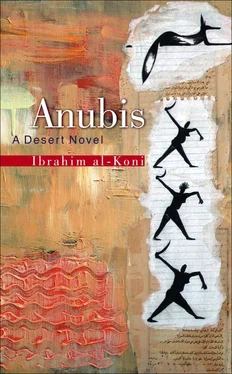At that she spoke. She spoke while I listened to words like a prophecy issuing from the peak of the mountain rather than from the mouth of a creature named woman: “Master, has there ever been any difference between men and jinn? Didn’t you tell me some days ago that you donned the body of a gazelle to save yourself?”
“You’re right. The truth is that I shouldn’t search for any distinction between men and jinn, between a man and gazelles or Barbary sheep, even between animals and the plants animals consume, or between plants and the earth’s soil that nourishes the plants, for I am everything, and everything is really me.”
She smiled slyly but said nothing. I too kept my peace, but under my breath I chanted my insane refrain, “Wherever you come from, there you’ll return, for man, like a caravan, would not be man unless he returned to his point of departure.”
I chanted until I reached the strip of land that is the point of no return. There, at the gap of the unknown, I left her to her fate and fled. Leaping like a Barbary ram, I disappeared behind the boulders that demarcate the deadly opening from the west. I did not pause but continued leaping as though fleeing from my own shadow. I dodged the rocks that obstructed my progress without ever slowing my pace. I did not pause to catch my breath until I had traversed much of the distance on the long way back, while the horizons became covered with the sky’s gloom. Then I stretched out to rest. I lay down and dozed off out of sheer exhaustion. I did not awake until the horizons were imbued with daybreak’s dazzling firebrand. I jumped up in alarm, for I had witnessed a prophetic vision in my slumber. As I slept, I had seen the she-jinni slither across the earth like a serpent and search in the sun-baked earth for treasure, digging up hard, fiery lumps with both hands. She dug with the insane intensity with which thirsty people excavate parched depths, even though she knew full well she would find nothing there. Despite that certainty, she did not despair. The spirit world mocked her efforts and wrapped them in floods of fraudulent fluids, so that from a distance the poor body seemed a toy teased by the mirage’s tongues, which alternately drowned her in the sea and plucked her from its waves, letting her float on the surface of this imaginary flood. This struggle awakened in my heart something I had never experienced before. It awakened in my breast a new inspiration and an insistent whispering that struggled against forgetfulness for a long time before memory told me it was what nations call “compassion.” Compassion convulsed me, and I leapt from my sleep and shot off at a gallop over the route I had taken. I raced back with a crazed passion that exceeded that with which I had fled. On my way to the point of no return, I shouted repeatedly, “I never for a moment imagined a child of the jinn could perish of thirst. Forgive me!” I repeated this cry to help me last the distance.
I said aloud, “I’ll kill myself if the poor woman has perished before I reach her, because her blood will be on my hands.” I wondered about the secret of compassion while I wept. When I finally reached the point of no return, I found I was too late. I heard an uproar there and then saw in the distance the disorganized caravan that had snatched her away before I could reach her.
FINDING MYSELF EMBRACED by solitude once more, I sang my sorrows, chanted my loneliness, and in verse questioned my true nature. I was tormented by yearnings for the unknown and attempted to work off my longings among the rocky boulders. I contrived to cut solid rock into a splendid statue and determined to erect it as a landmark, thus satisfying an unexplained craving that I sensed as a persistent, hushed call in my soul, even though I had never managed to grasp it intellectually. I thought the statue excellent. Washed each morning by rays from my master Ragh, it whispered to the sky a secret it had borrowed from my hands, from my pulse, and from my heart, after this secret had thwarted my tongue. My sole remedy for my weakness was to stroke its torso at dawn each day and shortly after sunset.
After finishing the statue, I felt another strange need. Was it for security? Was it for warmth? Was it for the tranquility that only a nest can provide? I knew the ways of solitude, which likes to wear many veils. I also knew that my thirst for a statue had been an attempt to defend myself against my true love, solitude herself. I had to recognize that the need for a nest was quite simply another face of this beloved, about whom I could swear I was as hard put to live without as to live with. It was a long time before I grasped that this is true of every authentic beloved. I still do not know whether my need for a nest arose from a desire for my beloved seclusion or from a desire to avoid her. Certainly considerations of heat, cold, or wind were not responsible, since I was accustomed to shielding myself from heat in the shade of the palm groves and from cold or dust storms in the caves of the ancestors in the southern mountain range. I had noticed that this unaccountable need had developed with the passing days into a bitter hunger, a genuine thirst that would need to be slaked. I did not feel satisfied again until I had cut from the palm groves bushy fronds, which I wove into the shape of a cylindrical hut. I thought it was splendid too. I entered it on the seventh day to rest and stretched out in its cavity, which embraced me as a nest embraces fledglings. It swallowed me the way a tomb swallows the corpse. I liked this image so much that I named my cozy nest azkka .
Yes, my tomb truly was cozy, and I grew accustomed to sleeping inside it while I roamed far away in visionary dreams. I sought shelter inside at midday and when evening fell, stretching out on my back and roaming and roaming where there was no barrier to stop me, no barricade to obstruct my way, no rocks to scrape my shin, and no rough terrain to impede my progress. Inside that space, no cares, reptiles, or wild creatures — the offspring of men, jinn, or animals — threatened me. In my nest’s embrace, borne off on one of my trips, I did whatever I wished, without being visited by any harm or disturbed by any whispered temptations. I would shoot off to the east and west, deeply furrow the earth, cut the horizons down to size, plunge into the watery depths, and journey to the sky. I returned once from a journey to the sky with the question: “Who am I?” It tormented me because I could not answer it. I exhausted myself on these journeys, thinking I might find the answer in the unfathomable expanses but returned from each disappointed. Disappointment left me bitter, dispirited, and melancholy; and I emerged from my cozy redoubt one day to find myself banished once again, exiled from my own land, which I had created with my own hands. I ceased journeying on the wings of dreams and exchanged these voyages through the unknown for voyages of the body. As I wandered aimlessly, I would ask out loud, “Who am I?” and the echo from the mountainous caverns would not vouchsafe any response.
The question “Who am I?” shook my sense of wellbeing, and the whisperings returned, destroying my peace of mind. Then I chased every which way. I did not totally abandon my tomb but did not find inside it the comfort I had discovered there when I first created it. A murky sensation would vibrate my chest and bring me back to the nest once more. The hut’s framework continued to taunt me and to fascinate me. My experience is that a fleeting sign always conceals a treasure, which vanishes and is dispersed if we ignore or neglect it. If we strip it bare and wrestle with it, it discloses its secret and gives itself to us. This insight inspired me to resist my murky feeling for a time. In only a matter of weeks its true nature was revealed to me for I saw that I would never feel satisfied or calm or acquire peace of mind unless I married my awe-inspiring stone idol, which I had erected at the foot of the mountain, with the cozy dome, which I had installed in the valley.
Читать дальше












